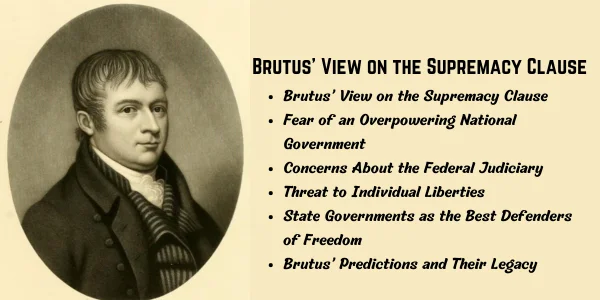The Supremacy Clause, found in Article VI, Clause 2 of the United States Constitution, establishes that federal law takes precedence over state laws and constitutions. While this clause was designed to create a unified legal framework for the country, it faced strong opposition from Anti-Federalists, particularly from an anonymous writer known as Brutus. Brutus, believed to be Robert Yates, was a key opponent of the Constitution and wrote a series of essays arguing against its ratification. He feared that the Supremacy Clause, along with other provisions, would lead to an overly powerful federal government that would weaken state sovereignty and threaten individual freedoms.
1. Brutus’ View on the Supremacy Clause

Brutus expressed his concerns about the Supremacy Clause in his Anti-Federalist Papers, particularly in Brutus No. 5 and Brutus No. 6. He argued that the clause, combined with the Necessary and Proper Clause and the federal judiciary’s power, would enable the national government to gradually erode state authority.
The Supremacy Clause states:
“This Constitution, and the Laws of the United States which shall be made in Pursuance thereof; and all Treaties made, or which shall be made, under the Authority of the United States, shall be the supreme Law of the Land; and the Judges in every State shall be bound thereby, any Thing in the Constitution or Laws of any State to the Contrary notwithstanding.”
To Brutus, this meant that state governments would become secondary to the federal government, effectively diminishing their power.
2. Fear of an Overpowering National Government
One of Brutus’ main objections was that the Supremacy Clause would allow federal laws to override state laws in almost any situation. He believed this would eventually lead to a consolidation of power in the national government, reducing states to mere administrative units rather than independent governing bodies.
Brutus and other Anti-Federalists were strong supporters of decentralized power, meaning they wanted state governments to have more control over local matters. They feared that if the federal government had too much authority, it could lead to a system resembling monarchy or tyranny.
3. Concerns About the Federal Judiciary
Brutus was also deeply concerned about the role of the Supreme Court in interpreting the Constitution. He believed that the Supremacy Clause, when combined with the power of the federal judiciary, would allow the national government to decide the limits of its own authority. In Brutus No. 11, he warned that the Supreme Court would become too powerful because:
- It had the final say on constitutional matters.
- It could interpret the Supremacy Clause in ways that expanded federal power at the expense of states.
- There was no higher authority to check the court’s decisions.
Brutus feared that unelected judges would have lifetime appointments, making them unaccountable to the people and states.
4. Threat to Individual Liberties
Another major concern for Brutus was that a strong federal government, empowered by the Supremacy Clause, would eventually infringe on individual rights. Before the Bill of Rights was added, the Constitution did not explicitly guarantee freedoms like freedom of speech, religion, or trial by jury at the national level. Brutus argued that a powerful federal government would use the Supremacy Clause to enforce laws that restricted personal liberties, without needing approval from the states.
5. State Governments as the Best Defenders of Freedom
Brutus believed that state governments were closer to the people and therefore more capable of protecting their rights. He worried that a distant federal government, ruling over a large territory, would not be responsive to the needs of citizens. Instead, he supported a confederation model, where states retained most of their power and only delegated limited authority to the national government.
6. Brutus’ Predictions and Their Legacy
Brutus’ fears were not entirely unfounded. Over time, the federal government has expanded its power through various Supreme Court rulings that reinforced the Supremacy Clause. For example:
- McCulloch v. Maryland (1819): The Supreme Court ruled that state governments could not interfere with federal institutions, reinforcing federal supremacy.
- Cooperative Federalism: Throughout U.S. history, the national government has used its authority (sometimes controversially) to override state laws, especially in areas like civil rights, healthcare, and education.
However, the Bill of Rights (1791) addressed many of Brutus’ concerns by explicitly protecting individual liberties, limiting federal power to some extent.
Conclusion
Brutus opposed the Supremacy Clause because he feared it would lead to a central government with too much power, diminished state authority, and a loss of individual freedoms. His concerns were part of a broader debate between Federalists and Anti-Federalists, shaping the balance of power in the U.S. government. While his predictions about federal power expansion were somewhat accurate, the Bill of Rights and later amendments helped safeguard individual liberties. His arguments remain relevant today in discussions about states’ rights vs. federal authority in issues like healthcare, education, and gun control.



